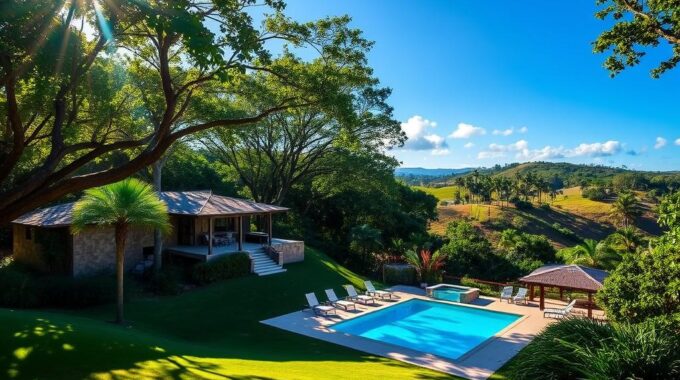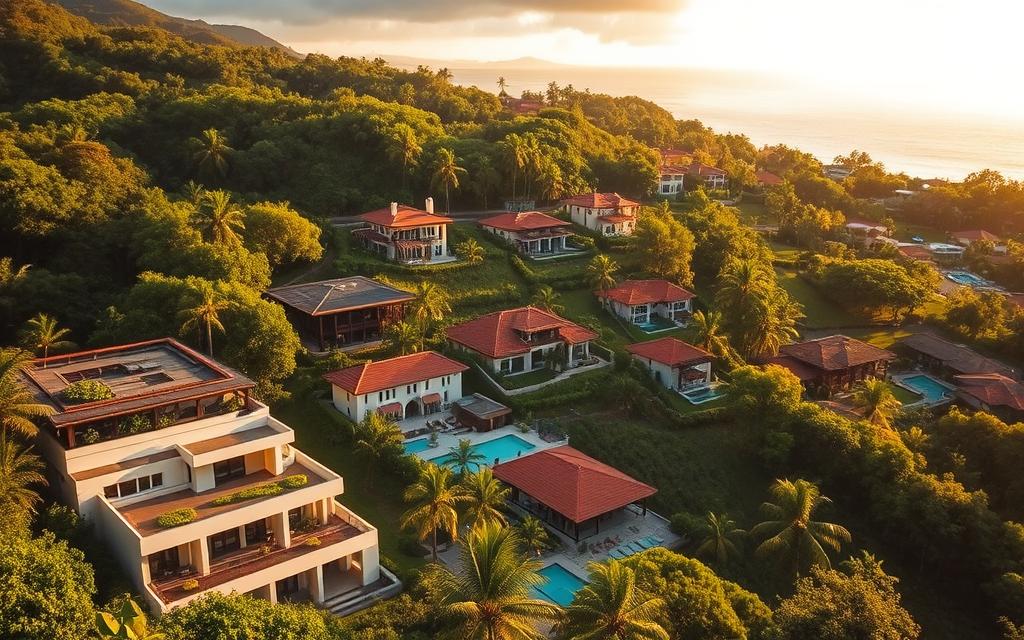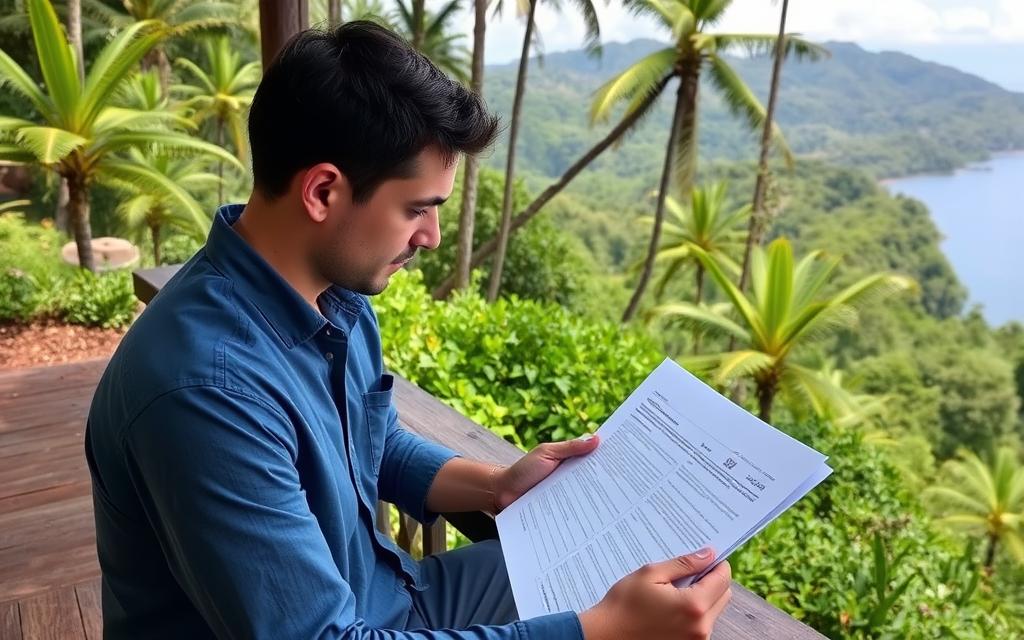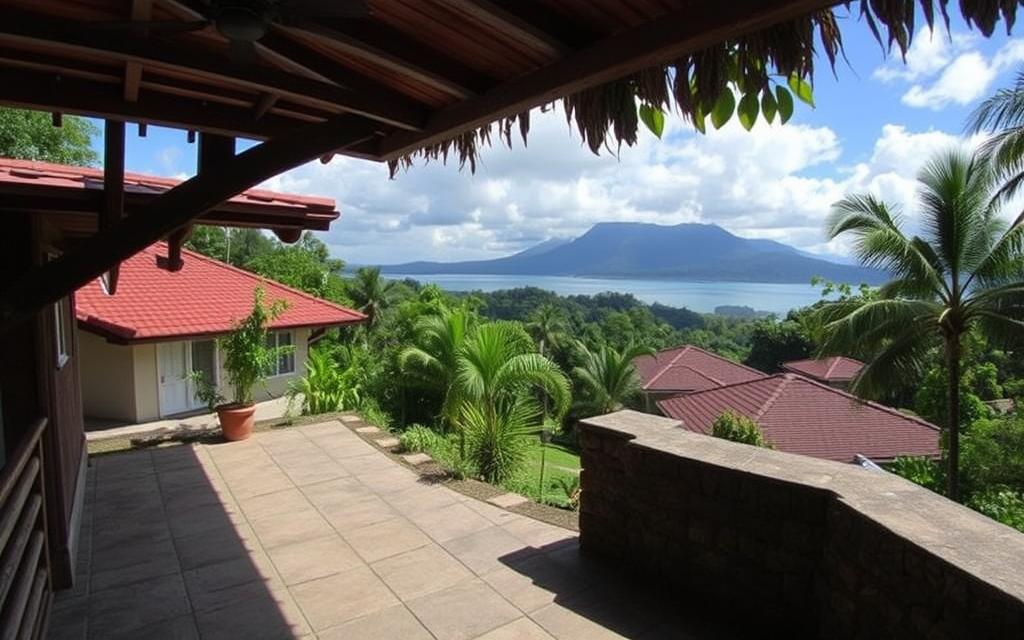Discover private lending for high-yield investments Costa Rica with GAP Investments. Secure investments with competitive interest rates from 12% to 18% annually.

Understanding Property Ownership and Costa Rica Immigration With CRIE
Costa Rica has become a haven for foreign investors and potential residents, thanks to its stable political environment and investor-friendly policies. At Costa Rica Immigration Experts (CRIE), we’ve guided numerous clients through the process of achieving their dream of living in Costa Rica.
With over 20 years of experience, CRIE is one of the oldest and most trusted immigration firms in the country. We help foreigners navigate the complexities of property ownership and immigration. In Costa Rica, foreigners enjoy the same rights as locals when it comes to property ownership, with options like fee simple and concession ownership.
Our expertise will guide you through the legal framework, due diligence processes, and immigration pathways related to property investment, making your journey to residency smoother.
The Costa Rican Property Landscape for Foreign Investors
Costa Rica’s unique blend of natural beauty, stable politics, and favorable investment climate makes it an ideal location for foreign property investors. We will explore the key aspects that make Costa Rica a welcoming destination for international investors.
Equal Rights for Foreign Property Owners
Costa Rica stands out in Central America for its welcoming approach to foreign property investors, offering equal rights to foreigners and nationals in most property transactions. Foreign investors can purchase property without residency requirements, citizenship status, or minimum investment thresholds in most areas of Costa Rica. This equality under the law provides a secure foundation for foreign investment.
Political Stability and Investment Security
The country’s long-standing political stability, dating back to the abolition of its military in 1949, has created a secure environment for real estate investment that’s rare in the region. Costa Rica’s stable democracy and legal system provide essential protections for property rights, making it an attractive destination for international investors. The real estate market in Costa Rica offers a diverse range of opportunities, from beachfront properties to mountain retreats, urban condominiums to rural farmland.
Types of Property Ownership in Costa Rica

When investing in Costa Rica, understanding the different types of property ownership is crucial for making informed decisions. Costa Rica offers three primary types of property ownership structures that foreign investors should understand before making purchasing decisions.
Fee Simple Ownership: Full Property Rights
Fee Simple Ownership represents the most comprehensive package of property rights in Costa Rica, granting owners complete control over their land and buildings. With this type of ownership, you own the land and any buildings on it outright, can develop it in accordance with local rules, and can sell, rent, or give it away as you see fit. You can also leave it to your heirs and pay yearly property taxes of about 0.25% of the registered value. For more information on buying property in Costa Rica as a foreigner, visit CRIE’s guide.
Concession Properties in the Maritime Zone
Concession Properties are primarily found in the Maritime Zone, where the government maintains ownership of the land while granting usage rights for specific periods. The government owns the land, but lets you use it for a set period, typically requiring higher annual fees than standard property taxes, ranging from 2-5% of the property’s value. You must follow the rules in your concession agreement and obtain government approval to sell your rights to someone else.
Possession Rights Properties
Properties lacking formal registration in the National Registry represent a riskier investment, as ownership is based on continuous occupation rather than official documentation. This type of property ownership carries significant risks, and it’s essential to understand the implications before making a decision.
In conclusion, understanding the different types of property ownership in Costa Rica is vital for foreign investors. Each ownership type carries distinct rights, responsibilities, and potential limitations that can significantly impact the property’s value and usability. By comprehending these differences, investors can make informed decisions and navigate the Costa Rican real estate market with confidence.
- Costa Rica offers three primary types of property ownership structures.
- Fee Simple Ownership provides complete control over land and buildings.
- Concession Properties are found in the Maritime Zone with government-owned land.
The Maritime Zone Law and Its Implications
Navigating the complexities of Costa Rica’s Maritime Zone Law is vital for successful property investment. The Maritime Zone Law, or Ley de Zona Marítimo Terrestre, is a critical regulation affecting coastal property ownership in Costa Rica.
Public Zone vs. Restricted Zone
The law divides coastal areas into two distinct zones: the Public Zone and the Restricted Zone. The Public Zone, extending 50 meters from the high tide line, is public land that no one, including Costa Ricans can own. The Restricted Zone, covering the next 150 meters, has special ownership limitations.
Foreign investors face restrictions in the Restricted Zone, where they cannot directly own more than 49% of a property unless they have obtained legal residency in Costa Rica. Many foreign investors use Costa Rican corporations to hold property in this zone, with at least 51% of the shares owned by a Costa Rican citizen or legal resident.
Special Exceptions to Maritime Zone Restrictions
Approximately 5% of Costa Rica’s beaches have special rules that allow for private ownership closer to the shore, primarily in areas developed before the enactment of the Maritime Zone Law. Places like Jaco Beach and parts of the Gulf of Papagayo have beachfront properties that can be owned outright.
Understanding these coastal property regulations is essential for investors interested in beachfront or near-beach properties in Costa Rica. The Maritime Zone regulations were designed to protect Costa Rica’s coastlines while allowing for controlled development and the establishment of tourism infrastructure.
Essential Due Diligence for Property Purchases
The process of buying property in Costa Rica involves a critical step known as due diligence. This thorough investigation is essential for verifying the property’s legal status, physical characteristics, and compliance with local regulations.

Title Search and Property Registry Verification
A comprehensive title search through the National Registry (Registro Nacional) is crucial to verify the seller’s ownership and identify any liens or encumbrances on the property. This step ensures that the property is free from legal disputes and that the seller has the right to sell.
Property Survey and Boundary Confirmation
Obtaining a recent survey map (plano catastrado) is vital to confirm the property’s boundaries, especially for undeveloped land. This helps prevent boundary disputes and ensures that the property’s physical characteristics match the seller’s descriptions.
Environmental and Zoning Regulations
Costa Rica has strict environmental laws, and properties may be subject to restrictions if they contain protected areas or are near national parks. Additionally, zoning regulations vary between municipalities, making it necessary to obtain a land use certificate (Certificación de Uso de Suelo) to confirm permitted uses for the property.
For more information on navigating the complexities of property ownership and immigration to Costa Rica, visit CRIE’s guide.
Legal Structures for Property Ownership
When investing in Costa Rican property, understanding the legal structures for ownership is crucial. Many foreign investors choose to hold their Costa Rican property through a local company, which can offer various advantages for liability protection and estate planning.
Sociedad Anónima (SA) vs. Sociedad de Responsabilidad Limitada (SRL)
The two primary corporate structures used for property ownership in Costa Rica are the Sociedad Anónima (SA) and the Sociedad de Responsabilidad Limitada (SRL). The SA structure resembles a C Corporation in the US, offering easy transferability of shares through stock certificates. In contrast, the SRL is similar to a US LLC, with lower administrative requirements but more restrictions on transferring ownership interests.
Benefits and Considerations of Corporate Ownership
Corporate ownership can provide liability protection by separating personal assets from property-related liabilities. It can also simplify property management when owners are not in Costa Rica by allowing local representatives to act on behalf of the corporation. However, for US citizens, corporate ownership structures in Costa Rica can create complex tax reporting requirements under FATCA and other regulations.
It’s essential to weigh the benefits against the potential complexities and seek professional advice to determine the most suitable legal structure for your property ownership needs in Costa Rica.
Understanding Property Ownership and Costa Rica Immigration
Costa Rica offers a unique opportunity for foreign property owners to transition into residency through its investor visa program. This program is designed to attract foreign investment into the country, and property purchases can be a significant part of this investment.
Property Investment as a Path to Residency
Investing in Costa Rican property can be a strategic pathway to obtaining legal residency. The Inversionista (Investor) visa program allows foreign investors to apply for residency after investing at least $150,000 in the country. This investment can be in the form of real estate, provided the officially registered property value meets or exceeds the required threshold.
The Inversionista Visa Requirements
To qualify for the Inversionista visa, applicants must meet specific requirements, including proof of investment, a clean police record from their home state, and health insurance that covers them in Costa Rica. All documents from outside Costa Rica must be authenticated through the apostille process. The initial residency is temporary for three years, during which time residents must visit Costa Rica at least once a year to maintain their status.
- The Inversionista residency program requires a minimum investment of $150,000 in Costa Rica, which can be satisfied through real estate purchases.
- Property investments must be appropriately registered with both the Municipality and the National Registry.
- After three years, investors can apply for permanent residency, offering additional benefits.
Start your residency process with us today, and you’ll never have to leave Costa Rica again. We guide you through the process, ensuring that your investment is properly registered and that you meet all the requirements for residency.
Financial Considerations for Property Buyers
Understanding the financial aspects of buying property in Costa Rica is crucial for a smooth transaction.

Closing Costs and Transfer Taxes
When buying property in Costa Rica, it’s essential to budget for closing costs, which typically range from 3.5% to 4.5% of the property’s registered value. These costs include a transfer tax of 1.5% of the property’s registered value, legal stamps and fees of about 1%, notary fees ranging from 1% to 2%, and registration fees of 0.5%. Legal fees usually amount to 1-1.5% of the property value.
Buyers should be aware that these costs can vary based on the property’s value and the complexity of the transaction. Sometimes, buyers and sellers negotiate who pays these costs.
Financing Options for Foreign Buyers
Financing options for foreign buyers in Costa Rica are limited. Local banks rarely approve mortgage applications from non-residents, regardless of their credit history or down payment size. As a result, many foreign buyers opt for alternative financing methods.
Some common alternatives include using international lenders that specialize in overseas property, seller financing, and cash purchases. The latter is the most common method among foreign buyers. Additionally, some buyers utilize self-directed retirement accounts to finance their property purchase.
It’s also worth noting that the closing process in Costa Rica involves an escrow agent who holds funds until all conditions of the sale are met, providing security for both parties.
Tax Implications for Foreign Property Owners

As foreign property owners in Costa Rica, we must navigate the complexities of tax obligations in both Costa Rica and our home countries. Owning property in Costa Rica involves paying various taxes, including property tax, luxury home tax, and capital gains tax.
Annual Property and Luxury Home Taxes
Costa Rica’s annual property tax is relatively low at 0.25% of the registered property value. However, properties valued over approximately $250,000 are subject to an additional luxury home tax ranging from 0.25% to 0.55%. It’s worth noting that the luxury property tax does not apply to vacant land without structures.
Property owners are technically required to update the declared value of their property every five years. However, enforcement of this requirement varies by municipality, and many owners do not update the declared value, resulting in properties being under-assessed.
Rental Income and Capital Gains Taxation
Rental income from Costa Rican properties is taxed at a flat 15% rate applied to 85% of the gross rental amount. An additional 13% VAT is applicable to short-term rentals under 30 days. Capital gains from property sales in Costa Rica are generally taxed at 15%, though certain exceptions may apply depending on when the property was acquired and how it was used.
US citizens must report worldwide income, including rental income from Costa Rican properties, on their US tax returns. Foreign tax credits may help avoid double taxation.
Common Pitfalls and How to Avoid Them

When investing in Costa Rican property, foreign buyers must be aware of potential pitfalls. The process of purchasing land in Costa Rica can be complex, involving various legal and regulatory considerations.
Boundary Disputes and Title Issues
Boundary disputes are common, particularly with rural properties. To avoid these issues, it’s crucial to conduct a professional survey to confirm property lines. Additionally, title issues can arise from improper registrations or undisclosed liens. A comprehensive title search through the National Registry is essential to ensure clear ownership.
Environmental Restrictions and Zoning Violations
Costa Rica’s strict environmental laws can significantly restrict development on properties with protected ecosystems. It’s vital to ensure that development plans comply with these regulations to avoid costly fines or project halts. Moreover, verifying permitted land uses through municipal zoning certificates can prevent zoning violations, which may lead to demolition orders or significant penalties.
Working with experienced legal professionals who specialize in Costa Rican real estate law is key to navigating these challenges. They can help identify potential issues early in the process, ensuring a smoother transaction.
Popular Regions for Foreign Investment

With its lush landscapes and extensive coastlines, Costa Rica offers a wide range of investment opportunities for foreign buyers. The country’s diverse regions cater to different lifestyle preferences, from vibrant beach communities to tranquil mountain retreats and convenient urban centers.
Beach Communities: Tamarindo, Manuel Antonio, and Jaco
Tamarindo in Guanacaste province has emerged as one of the most popular beach destinations for foreign investors, offering a well-established expat community, excellent surfing conditions, and a range of property options from condominiums to luxury villas. Manuel Antonio combines the appeal of pristine beaches with proximity to a world-famous national park, creating strong rental potential for investment properties in this region. For more information on property ownership in Costa Rica, visit CRIE’s guide.
Urban and Mountain Options: Escazu and Beyond
Jaco offers a more developed beach city experience with robust infrastructure, year-round tourism, and a wide range of property price points, making it accessible to various investment budgets. For investors who prefer urban amenities, Escazu offers an upscale suburban experience near San José, featuring international schools, shopping centers, and medical facilities. Mountain communities in the Central Valley offer cooler climates and spectacular views, with areas like Atenas and Grecia becoming increasingly popular among retirees and remote workers.
Property values vary significantly by region, with beachfront and ocean-view properties in established areas commanding premium prices, while emerging markets and inland properties often offer better value and growth potential.
How CRIE Facilitates Property Ownership and Immigration
CRIE’s comprehensive services bridge the gap between property ownership and immigration requirements, providing a one-stop solution for foreign investors. With over 20 years of experience and thousands of successful residency applications, CRIE has established itself as one of the most trusted immigration firms in Costa Rica.
Comprehensive Immigration Services
CRIE’s immigration experts offer personalized consultations that take into account each client’s unique situation, including family size, document requirements, and specific immigration objectives. Their comprehensive immigration services include document preparation, translation, authentication, submission to government agencies, and follow-up throughout the entire residency process.
Personalized Consultation Process
The personalized consultation process begins with an initial assessment to determine the most appropriate residency category based on the client’s property investments and personal circumstances. CRIE’s expertise in both property regulations and immigration requirements allows them to guide clients in structuring their investments to maximize immigration benefits.
We know you have many questions, and we would like to schedule a call with our immigration expert to answer them. Every residency application is unique, so to provide you with the most accurate pricing and service options tailored to your specific situation, our immigration experts will consider all factors, including family size and document requirements, to offer the best price and solutions for your needs.
For a personalized consultation, you can reach us at: WhatsApp CR: +(506)-8373-2085 or +(506)-8706-3888, Call from the USA: +1 (305)-906-6784, Call from Canada: +1 (416)-900-5773, or visit our website at www.crie.cr and email us at info@crie.cr.
Conclusion
For those looking to invest in Costa Rica, the key to success lies in thorough preparation and expert advice. Understanding property ownership in Costa Rica is a multifaceted process that requires careful consideration of legal structures, due diligence procedures, and immigration implications. CRIE offers the expertise and guidance necessary to navigate both property acquisition and residency applications, creating a seamless path to establishing your life in Costa Rica. With proper planning and expert guidance, property ownership can provide a valuable asset and a gateway to a new lifestyle. Start your residency process with us today, and you’ll never have to leave Costa Rica again.


